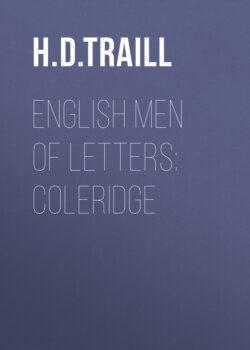English Men of Letters: Coleridge

Реклама. ООО «ЛитРес», ИНН: 7719571260.
Оглавление
H. D. Traill. English Men of Letters: Coleridge
English Men of Letters: Coleridge
Table of Contents
Poetical Period
Critical Period
Metaphysical and Theological Period
Coleridge
Chapter I
Chapter II
Chapter III
Chapter IV
Chapter V
Chapter VI
Chapter VII
Chapter VIII
Chapter IX
Chapter X
Chapter XI
Chapter XII
Index
Отрывок из книги
H. D. Traill
Published by Good Press, 2019
.....
A study of these crude but vigorous addresses reveals to us, as does the earlier of the early poems, a mind struggling with its half-formed and ever-changing conceptions of the world, and, as is usual at such peculiar phases of an intellectual development, affirming its temporary beliefs with a fervour and vehemence directly proportioned to the recency of their birth. Commenting on the Conciones ad Populum many years afterwards, and invoking them as witnesses to his political consistency as an author, Coleridge remarked that with the exception of "two or three pages involving the doctrine of philosophical necessity and Unitarianism," he saw little or nothing in these outbursts of his youthful zeal to retract, and, with the exception of "some flame-coloured epithets" applied to persons, as to Mr. Pitt and others, "or rather to personifications"–for such, he says, they really were to him–as little to regret.
We now, however, arrive at an event, important in the life of every man, and which influenced that of Coleridge to an extent not the less certainly extraordinary because difficult, if not impossible, to define with exactitude. On the 4th of October 1795 Coleridge was married at St. Mary Redcliffe Church, Bristol, to Sarah (or as he preferred to spell it Sara) Fricker, and withdrew for a time from the eager intellectual life of a political lecturer to the contemplative quiet appropriate to the honeymoon of a poet, spent in a sequestered cottage amid beautiful scenery, and within sound of the sea. No wonder that among such surroundings, and with such belongings, the honeymoon should have extended from one month to three, and indeed that Coleridge should have waited till his youthful yearnings for a life of action, and perhaps (though that would have lent itself less gracefully to his poem of farewell to his Clevedon cottage) his increasing sense of the necessity of supplementing the ambrosia of love with the bread and cheese of mortals, compelled him to re-enter the world. No wonder he should have delayed to do so, for it is as easy to perceive in his poems that these were days of unclouded happiness as it is melancholy to reflect by how few others like them his life was destined to be brightened. The Æolian Harp has no more than the moderate merits, with its full share of the characteristic faults, of his earlier productions; but one cannot help "reading into it" the poet's after-life of disappointment and disillusion–estrangement from the "beloved woman" in whose affection he was then reposing; decay and disappearance of those "flitting phantasies" with which he was then so joyously trifling, and the bitterly ironical scholia which fate was preparing for such lines as
.....